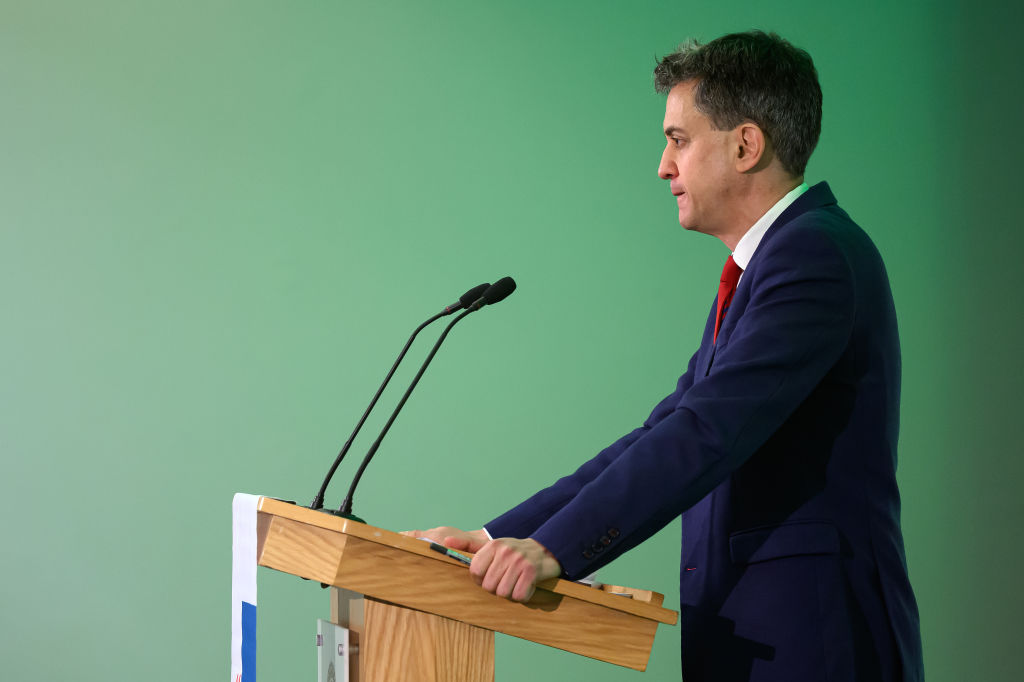
The Labour leader Keir Starmer is criticised in some quarters for lacking a clear world-view. “Starmerism” is inchoate. Its offer is seen as managerial rather than visionary or transformative. But the beginnings of a positive programme have begun to emerge from sections of the shadow front bench.
On Tuesday 28 March, in a speech in Westminster, Ed Miliband, the shadow climate change and net zero secretary, signalled a clearer direction of travel for the party on the economy and the green transition, policy areas that are now inextricably linked. After the party leadership outlined its stance on law and order – in a bid to prove to socially conservative voters that it isn’t held back by a liberal aversion to tougher policing, prisons or sentencing – Miliband touted a “Green Prosperity Plan”. The aim, Miliband told the audience of business people, think tankers and politicos, is to mirror the US president Joe Biden’s Inflation Reduction Act. The government is preparing its own “Green Day” of policy announcements, expected this week.
Biden‘s legislation promises almost $400bn of government spending on green energy and green technology. It provides subsidies for electric vehicle and battery components manufactured in the United States, and it provides incentives for private sector investment to follow the vast pile of publicly funded stimulus. Kemi Badenoch, the UK Business Secretary, has described it as “protectionist” while Grant Shapps, the Energy Security and Net Zero Secretary, described it as “dangerous”. The EU has responded with its own multi-billion Green Deal Industrial Plan to prevent green capital flowing out of Europe and into the US to take advantage of its generous schemes.
[See also: The UK’s rising inflation rate has a hidden cause: corporate greed]
But for Miliband, Biden’s is a “green, modern industrial policy… This is about an active state deploying public investment to crowd in and catalyse private investment.” To that end, Rachel Reeves, the shadow chancellor, has allocated £28bn of capital spending a year for Labour’s Green Prosperity Plan. It is still not clear exactly what that will be spent on. A further £8bn has been promised for a National Wealth Fund to upgrade ports, invest in gigafactories, electric vehicle production and green hydrogen for steel. “The mission is simple,” Miliband said. “To bring more good jobs back to Britain’s industrial heartlands. To re-industrialise as we decarbonise.”
Take away the environmentalism and there are echoes of Donald Trump’s rhetoric here; the former president lamented that “the jobs left and the factories closed” in his inaugural address and promised to bring those jobs back. In fact, there’s more than a little overlap between Biden’s agenda – which Miliband and Starmer seem to have adopted – and his predecessor’s. Total acceptance of globalised markets and open economies has been jettisoned. There are continued tariffs and competition with China, and a limited protectionism and economic nationalism meant to bring industries back to America, so Badenoch and Shapps’s criticisms aren’t unfounded. After the Covid-19 pandemic and the war in Ukraine, and with the pressing need to cut carbon emissions the new watchwords of political economy are resilience and security, rather than competition, efficiency and free trade.
“It is a rejection of the dominant economic model of the last four decades,” explained Miliband, “the displacement of economically valuable production has sucked wealth and productivity out of our economies and many of our communities have seen good wages replaced with insecurity and low wages.” The analysis could easily have come from the Corbynite shadow chancellor John McDonnell. “It’s a vision of well-paid, highly skilled jobs with strong unions,” Miliband added.
Miliband has put some flesh on the bones set out by Starmer in recent weeks. A comprehensive and detailed Green Prosperity Plan has yet to be published, but a statement of intent has been delivered. More confident and at ease than he was as Labour’s leader, Miliband managed to appear more sincere and less exasperated than Starmer, less traumatised by the experience of public speaking. Where the current leader of the opposition seems evasive and rehearsed, Miliband appears more genuine. On Tuesday he did a better job of being a political salesman, with a positive story to tell about a new economy combined with a fight against climate change – “the biggest market failure the world has ever known”, he says. He rightly apologised when he used the technocratic, Starmerite term “silo”.
As Labour gradually sketches out its own version of this new economic dispensation, it is the Conservative Party being left behind by global trends. In response to multiple crises, the US and Europe have ditched their ideological attachments to the old laissez-faire model, while China never really had any to begin with. Rishi Sunak and Jeremy Hunt’s government seems more reluctant to move with the times.
[See also: Rishi Sunak pledge tracker: UK inflation rises to 10.4 per cent]




